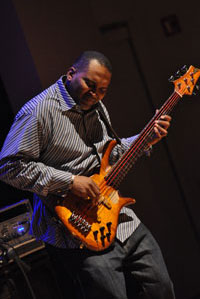
Phil Farnsworth
Lenny Stallworth
For media inquiries, please contact Media Relations
David "Lenny" Stallworth is an assistant professor at the Berklee College of Music who teaches in the Bass and Ensembles departments. He is currently touring with jazz trumpeter Roy Hargrove and his band, the RH Factor, in addition to jazz saxophonist Kenny Garrett and his quartet. He also has toured throughout America and Europe as the bassist for the legendary saxophonist Maceo Parker and his funk and soul band.
Stallworth has appeared in the Broadway musicals Five Guys Named Moe and Another Saturday Night. He has recorded with many artists in a wide variety of genres since his teenage days touring the "Chitlin' Circuit" with his first funk and soul band, the Super Soul Movement, in the 1970s. Today, his greatest inspiration comes from teaching. He has a special ability to motivate and inspire students while guiding them through their learning process and musical journey.
- Basisst
- Leader of Flipside and Funk Mob
- Member of Willow Entertainment
- Performances with Najee, Maceo Parker, Donald Brown, Ann Nesby, and Donell Jones
- Recordings with Rohn Lawrence, Teddy Riley, Ray Benzino, Brian McKnight, and Roy Hargrove's RH Factor
- Tours with Kenny Garrett and Roy Hargrove
